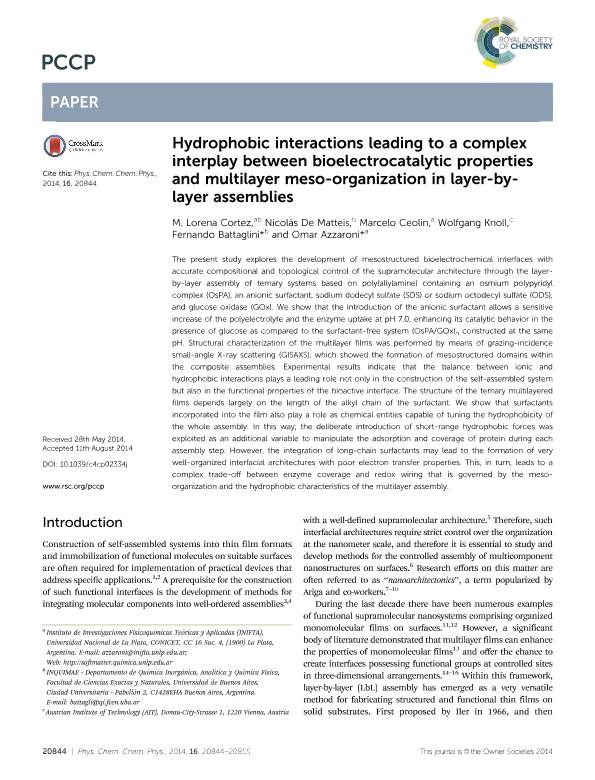Mostrar el registro sencillo del ítem
dc.contributor.author
Cortez, María Lorena

dc.contributor.author
De Matteis, Nicolás
dc.contributor.author
Ceolin, Marcelo Raul

dc.contributor.author
Knoll, Wolfgang
dc.contributor.author
Battaglini, Fernando

dc.contributor.author
Azzaroni, Omar

dc.date.available
2017-12-27T21:11:13Z
dc.date.issued
2014-03
dc.identifier.citation
Cortez, María Lorena; De Matteis, Nicolás; Ceolin, Marcelo Raul; Knoll, Wolfgang; Battaglini, Fernando; et al.; Hydrophobic interactions leading to a complex interplay between bioelectrocatalytic properties and multilayer meso-organization in layer-by-layer assemblies; Royal Society of Chemistry; Physical Chemistry Chemical Physics; 16; 38; 3-2014; 20844-20855
dc.identifier.issn
1463-9076
dc.identifier.uri
http://hdl.handle.net/11336/31762
dc.description.abstract
The present study explores the development of mesostructured bioelectrochemical interfaces with accurate compositional and topological control of the supramolecular architecture through the layer-by-layer assembly of ternary systems based on poly(allylamine) containing an osmium polypyridyl complex (OsPA), an anionic surfactant, sodium dodecyl sulfate (SDS) or sodium octodecyl sulfate (ODS), and glucose oxidase (GOx). We show that the introduction of the anionic surfactant allows a sensitive increase of the polyelectrolyte and the enzyme uptake at pH 7.0, enhancing its catalytic behavior in the presence of glucose as compared to the surfactant-free system (OsPA/GOx)n constructed at the same pH. Structural characterization of the multilayer films was performed by means of grazing-incidence small-angle X-ray scattering (GISAXS), which showed the formation of mesostructured domains within the composite assemblies. Experimental results indicate that the balance between ionic and hydrophobic interactions plays a leading role not only in the construction of the self-assembled system but also in the functional properties of the bioactive interface. The structure of the ternary multilayered films depends largely on the length of the alkyl chain of the surfactant. We show that surfactants incorporated into the film also play a role as chemical entities capable of tuning the hydrophobicity of the whole assembly. In this way, the deliberate introduction of short-range hydrophobic forces was exploited as an additional variable to manipulate the adsorption and coverage of protein during each assembly step. However, the integration of long-chain surfactants may lead to the formation of very well-organized interfacial architectures with poor electron transfer properties. This, in turn, leads to a complex trade-off between enzyme coverage and redox wiring that is governed by the meso-organization and the hydrophobic characteristics of the multilayer assembly.
dc.format
application/pdf
dc.language.iso
eng
dc.publisher
Royal Society of Chemistry

dc.rights
info:eu-repo/semantics/openAccess
dc.rights.uri
https://creativecommons.org/licenses/by-nc-sa/2.5/ar/
dc.subject
Self-Assembly
dc.subject
Bioelectrochemistry
dc.subject
Layer-Ny-Layer Assembly
dc.subject
Biorecognition
dc.subject.classification
Otras Ciencias Químicas

dc.subject.classification
Ciencias Químicas

dc.subject.classification
CIENCIAS NATURALES Y EXACTAS

dc.title
Hydrophobic interactions leading to a complex interplay between bioelectrocatalytic properties and multilayer meso-organization in layer-by-layer assemblies
dc.type
info:eu-repo/semantics/article
dc.type
info:ar-repo/semantics/artículo
dc.type
info:eu-repo/semantics/publishedVersion
dc.date.updated
2017-12-27T15:23:12Z
dc.journal.volume
16
dc.journal.number
38
dc.journal.pagination
20844-20855
dc.journal.pais
Reino Unido

dc.description.fil
Fil: Cortez, María Lorena. Consejo Nacional de Investigaciones Científicas y Técnicas. Centro Científico Tecnológico Conicet - La Plata. Instituto de Investigaciones Fisicoquímicas Teóricas y Aplicadas. Universidad Nacional de La Plata. Facultad de Ciencias Exactas. Instituto de Investigaciones Fisicoquímicas Teóricas y Aplicadas; Argentina. Consejo Nacional de Investigaciones Científicas y Técnicas. Oficina de Coordinación Administrativa Ciudad Universitaria. Instituto de Química, Física de los Materiales, Medioambiente y Energía. Universidad de Buenos Aires. Facultad de Ciencias Exactas y Naturales. Instituto de Química, Física de los Materiales, Medioambiente y Energía; Argentina
dc.description.fil
Fil: De Matteis, Nicolás. Consejo Nacional de Investigaciones Científicas y Técnicas. Oficina de Coordinación Administrativa Ciudad Universitaria. Instituto de Química, Física de los Materiales, Medioambiente y Energía. Universidad de Buenos Aires. Facultad de Ciencias Exactas y Naturales. Instituto de Química, Física de los Materiales, Medioambiente y Energía; Argentina
dc.description.fil
Fil: Ceolin, Marcelo Raul. Consejo Nacional de Investigaciones Científicas y Técnicas. Centro Científico Tecnológico Conicet - La Plata. Instituto de Investigaciones Fisicoquímicas Teóricas y Aplicadas. Universidad Nacional de La Plata. Facultad de Ciencias Exactas. Instituto de Investigaciones Fisicoquímicas Teóricas y Aplicadas; Argentina
dc.description.fil
Fil: Knoll, Wolfgang. Austrian Institute of Technology; Austria
dc.description.fil
Fil: Battaglini, Fernando. Consejo Nacional de Investigaciones Científicas y Técnicas. Oficina de Coordinación Administrativa Ciudad Universitaria. Instituto de Química, Física de los Materiales, Medioambiente y Energía. Universidad de Buenos Aires. Facultad de Ciencias Exactas y Naturales. Instituto de Química, Física de los Materiales, Medioambiente y Energía; Argentina
dc.description.fil
Fil: Azzaroni, Omar. Consejo Nacional de Investigaciones Científicas y Técnicas. Centro Científico Tecnológico Conicet - La Plata. Instituto de Investigaciones Fisicoquímicas Teóricas y Aplicadas. Universidad Nacional de La Plata. Facultad de Ciencias Exactas. Instituto de Investigaciones Fisicoquímicas Teóricas y Aplicadas; Argentina
dc.journal.title
Physical Chemistry Chemical Physics

dc.relation.alternativeid
info:eu-repo/semantics/altIdentifier/doi/http://dx.doi.org/10.1039/c4cp02334j
dc.relation.alternativeid
info:eu-repo/semantics/altIdentifier/url/http://pubs.rsc.org/en/Content/ArticleLanding/2014/CP/C4CP02334J#!divAbstract
Archivos asociados
